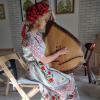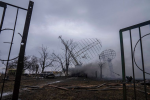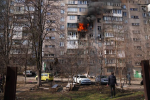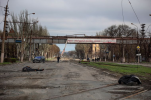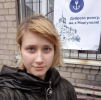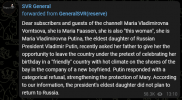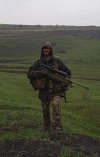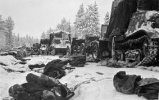lsoviha
Eversti
Tarina perheen matkasta Mariupolista donetskin kautta Lviviin. Rivien välistä tulkitsen, että nämä olivat vielä "onnekkaita" kun pääsivät lopulta perille.
https://hromadske.ua/posts/ya-prosi...bir-vustami-17-richnoyi-divchini-z-mariupolya
https://hromadske.ua/posts/ya-prosi...bir-vustami-17-richnoyi-divchini-z-mariupolya
Google käännös
"The war has begun. We are going! ”
On February 24, at 3:50, my mother heard the first explosion, ran to my younger sister and me in the room, and said loudly the worst words: “The war has started. We are going! ” Where are we going? How are we going? We quickly stuffed our bags with warm clothes and leftover food. We thought we could leave. But it did not work - the city was closed.
Then the real horror began. People ran out of houses, tried to buy everything, withdraw cash, and refuel cars. And there were explosions around.
At 12 o'clock in the afternoon, our house was already shaking. Which basement should we run to? I called the head of the condominium and asked where to hide. I was told that "our basement is not designed for this, there are windows, repairs, there is no way."
At that time we still had all the communications. We had a relatively small supply of food and water because we thought it would take 3-4 days.
"What is a bath in an ordinary Khrushchevka?" ( *is an unofficial name for a type of low-cost, concrete-*paneled or brick three- to a five-storied apartment building that was developed in the Soviet Union during the early 1960s, during the time its namesake Nikita Khrushchev directed the Soviet government).
Two days have passed since the beginning of the war, and communication, water, and light have disappeared. Later there was no gas. We realized that the situation was difficult.
Shells flew to Mariupol all this time. The left bank of the city was destroyed, explosive waves reached the Primorsky district, and everything roared.
In the apartment, we hung the windows and inserted foam between them. We thought it would protect us.
They decided to hide in the bathroom. There were days when we already knew what time we would be fired upon. As soon as there was a noise, a rustle, an explosion, they immediately ran to the bathroom. It gradually got boring. There was no hope that everything would end, that we would be saved. So what is a bath in an ordinary Khrushchevka?
One morning, I don't remember exactly what number we were all lying in the same room. They heard everyone walking around the apartment, something falling in the next room.
But we lay there thinking, no, it's far away, we don't believe it.
The vibrations of the earth began, and the house seemed to bounce. We quickly locked ourselves in the bathroom. At first, there was such silence, it seemed as if something was falling, and then the blast wave pierced everything to the bottom. The upper floors of the house just formed. Pieces of concrete, furniture, and slate from the roof fell, and glass flew. They were shouting everywhere.
"People were ready to kill each other for a sip of water"
We managed to get out of the house, my father ordered us to go quickly to the first-best basement.
Around the ice, glass, noise, shots, and we run and think: at least there were stairs to the basement, at least to go down, at least we were not crushed by the stove.
My sister ran to the basement first, followed by me and my parents. They started knocking and heard that there were people inside and they were whispering. Eventually, a man opened the door and said that he could not let us in - they say there are a lot of people in the basement, and there is no extra space. My father did not listen, pushed him away, and we went.
There were 20 people inside, our neighbors. Another family with a five-month-old baby came with us. That is, if we hadn't broken in, more than one family would have died under our house.
In the basement, we saw various horrors. People ran out of food, they turned into animals. They were ready to kill each other for a sip of water.
There was nothing to cook, water was extracted from ice and snow.
People were exposed to insane danger when they went outside - fragments, pieces of buildings, and stones flew at them.
One day a mine landed in front of our door. The hole was so big, that it seemed as if someone had dug deep. We thought we would fall asleep, the building had already begun to collapse. We were afraid that it would become our mass grave.
"In this basement were only our hope and prayer"
My mother has been suffering from polyneuropathy for six years. This is a lesion of the nervous system. Against the background of stress, she stopped walking, her heart stopped twice. Pharmacies did not work, we did not have drugs. The ambulance in front of our basement was destroyed.
My father resuscitated my mother as best he could - artificial respiration, heart massage. Pills had to be looked for under fire. We couldn't lose our mother. There was only our hope and prayer in this basement. And that's all.
On the tenth day of our stay there we had one piece of bread left. It was the size of my fist. We divided it into four times. I couldn't eat my piece because we were starving for a long time. He was with me for a very long time. I was afraid that everything would end and not even him.
People quarreled with each other, quarreled, tried to drive someone out of the basement so that there was one mouth less. There was no kindness, only darkness, and we could already smell death.
It lasted 12 days.
"We can't leave. This is my grave "
The shelling usually began at about four in the morning. Then there was a short break, and at 10 o'clock - again. But that day everyone woke up to an unprecedented noise at two in the morning. We lay and tried to fall asleep. The cup on the shelf above me jumped. The sound was as if I were lying down and four trains were passing by me on each side.
Usually, when they shot, a child cried, and someone read the prayer aloud. And that time everyone was silent.
Suddenly the ground began to tremble, it seemed as if everything was flying at us. Plaster and brick fell from the ceiling.
I lay and thought: we will not get out of here. This is my grave. I had already lost hope in everything, I could neither pray nor hope. It's over, it can't be so long. A person suffers for something, - I repeated to myself.
At that moment, I was sure that I would die and not die alone. My family was lying on the same blanket like me.
I still decided to pray. I asked God to die quickly and not to see the deaths of my relatives, not to see how they are suffering, and I can't help them.
We had nothing. No strength, no hope, not even a normal first aid kit. Everyone understood that if he hit, we would not get out of here. As in the next building, where no one got. Because it was forbidden by enemy soldiers, it was simply impossible.
"Either we starve to death, or we fall asleep, or we are just killed."
I don't remember how the days went by. We were tortured, hungry, tired. My father once said, "Either we die of starvation, or we fall asleep, or we are just killed." Russian soldiers walked through the basements, checked who was sitting there, and dropped bombs. When they knocked on our door, we did not answer.
One day we heard from neighbors that you can go to Melekino. My dad had an old Zhiguli (an old car made in USSR), broken from buildings and glass. We didn't even know if the car would start, but it moved. We drove under shelling, hail. The fighting continued, and we had one goal: to survive, to get out of this hell.
We almost reached Melekino, where the DNR post was located. They understood that we would not be able to return, and they did not want to go further: if they did not kill there, they would kill here, for the enemy we are nothing, just a target.
We were stopped at a checkpoint and asked about the place of registration. "Mariupol? To your right."
We didn't know what "right" was. From there we were directed further and further. So gradually formed a large column of cars and even people walking.
Later, the DNR military told him to go down. We moved, and they just shot at cars and people.
"With all our money we were able to buy two loaves of bread"
So we drove to Yalta (Donetsk region - ed.), where we hid for more than 10 days in an old boarding house. We had no food, we took water from a well. The cash we had left was nothing.
In Yalta, they changed the government to the DNR, and they allegedly tried to show themselves on the good side. They were invited to come to them, to give their name, and surname, in order to receive humanitarian aid. People went to survive, not to starve. But no rations were given there - they were received by locals, who sold them at the market at space prices.
There were also several shops in Yalta that imported Russian products. Prices are high, the queues are huge. With the money we had, we could only buy two loaves of bread. We protected them and hid them so that they would not be taken away.
Even then, there was a "denationalization" in Yalta: soldiers went from house to house, looking for "nationalists", "fascists", as they say there. People were taken away in unknown directions, someone was killed.
Hunger, cold, and fear of freezing
In Yalta, hunger, cold, and fear of freezing came to us again. All we had was fire, water, tea, and two loaves of bread. The parents decided to leave.
So we got to filter in Mangush. There were two camps. The first - is for people who walked. They could be filtered for more than a month, the queues were crazy. People tried their best to escape. And another camp was for those who are cars.
The camp is not a settlement, it's just a convoy of cars. There were 500 cars in line in front of us, thousands more behind us.
Getting out of cars, looking for food, and water, and going to the toilet were forbidden. Soldiers with weapons went everywhere, threatened, checked, and made sure everyone was there.
This filtration camp, we were told, was open from 5 a.m. to 11 p.m., but in fact, until they woke up, had breakfast, smoked, talked on the phone, changed, nothing started.
They had nothing to do with civilians. Every hour there were two if you're lucky - three cars. We lived in the car for two days waiting for our turn.
"Filtration begins at age 14"
Here's how filtering works: they have a checkpoint. There comes a car, where they check every pocket, glove compartment, trunk, every bag. People have clothes and what's under them. Men are undressed on the street near cars. They are looking for tattoos, some labels, in a word, "nationalists".
It happened that not all passengers from the car were filtered: they could pick up their father or mother, and the car had to move on. People were confused. They had weapons, but people had nothing.
Our turn came at 11 pm, we were the last car that day. We were launched and searched. My mother no longer went because of her illness. He and his sister were allowed not to leave: they said that "filtration begins at age 14".
My father and I went out. At a distance of 200 meters from our car was a booth with two rooms. Exhausted people stood on the street, they had no clothes, and it was cold outside. My legs were so cold then that I could not feel my toes.
They just walked, talked to each other, and discussed women who were tortured.
I heard conversations between them:
"And the one who didn't pass, where did you take him?" One of them asked.
"Yes, I shot him. Probably 10 already, maybe more. I'm not counting, I'm tired."
One man, who was going through the filtration, came out with huge, frightened eyes. It shook him. He said he was severely interrogated and beaten. His wife was never released.
"They tried to find people who love their homeland, who wanted to live normally"
Then it was our turn. I went to one filtration room, my father to another.
My fingerprints were taken, documents were scanned, and my phone was checked. They asked provocative questions. About the government, of Ukraine, about my own positions. They tried to find people who love their homeland, and who wanted to live normally. They are mocked, humiliated, and could beat us.
They took my passport and saw that I was 17. They didn't like me, I looked too young, and they were looking for some young girls.
I was pushed out of there. I was accompanied to the car by their armed soldier.
He pushed me because I was walking slowly. I fell and hit my knee, but I understood that if I didn't get up now and run to the car, I wouldn't go back. I ran with all my might.
My mother saw me alone. She began to panic: what about her father? He did not pass? Has he already been killed? Is he being bullied? And I couldn't say anything. She sat and did not know what would happen next.
However, the father returned in 40 minutes. We saw him being pushed out. He came out and fell. He tried to get up and fell. But still got to the car.
Due to the beating on the "filtration", the father lost his sight
My father pressed the gas and we set off. There was no direct road to Berdyansk: the bridge was blown up, so we drove around the neighborhood, villages. We saw corpses and broken equipment around.
Already on the way, the father began to have vision problems - he did not see.
In Berdyansk we spent the night in a car. Already there, the father told how his filtration took place.
He was also asked for documents, fingerprints, undressed, and searched. They began to interrogate, pressed morally. First pushed. When they saw that his phone was empty, the questions began: “Why is the phone empty? What are you hiding? We don't believe you! ” And he was just hit on the head. He does not remember who, how, and what. He remembers how he found himself on the street. My father lost his sight from that beating, and we still had to move on.
There were 27 checkpoints from Berdyansk to Zaporizhia, and each of them was checked for documents, a car, and asked if it was filtered. People were deprived of food, and warm clothes asked for cigarettes and even asked about drugs and alcohol.
We were driving, and there were fights nearby. Something flew under the car, there was an explosion, the car jumped. My father told me not to worry - maybe it was a firecracker. But we understood that there were no firecrackers in the war.
The road was difficult. We saw destroyed houses, anti-tank mines in the middle of the road, tanks with the letter Z in the yards, charred bodies along the road, and broken cars. The forest around us was burning.
"Don't be afraid. This is Ukraine"
At dawn, we drove to Orikhovo, Zaporizhzhia region. Ahead of us on the road were fireplace blocks, hedgehogs, thorns. It feels like it was easier to breathe, and then we saw the Ukrainian flag ahead.
At first, they were scared: is it a provocation? Is this another exam we have to pass?
We were stopped. They say: "Good afternoon! Please show the documents. "
We showed, although we were still convinced, that it was a provocation.
We were told: “Do not be afraid. This is Ukraine".
We started crying. They could not believe that we were under protection, that we had found our land.
Then we went to the refugee assistance center in Zaporizhia (city). My mother was given medical care because she wasn't able to walk. My father was very ill: he did not see. My sister and I are emotionally exhausted. We were psychologically broken.
Volunteers helped us get to the Dnipro (city).
In the city, the father was examined by two doctors, who concluded that he had an injury due to a concussion. In one eye - complete loss of vision and in the other see as if through a cellophane bag.
Volunteers sent us to Lviv (city) to receive quality medical care. Here the father was examined again. We were told that his treatment would be long, difficult, and expensive and that we might have to go abroad.
"We cannot lose our father. He saved us, now we have to help him, "Maria's mother, Natalia Serhiivna, added at the end of our conversation.

